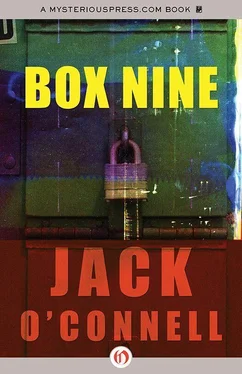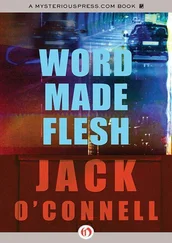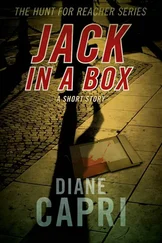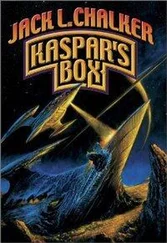“Because I am usually the only one in this room,” he says, “there is only the one chair. But I will sit on the floor. Good for me, for a change.”
“You need some books for your shelves,” Lenore says.
Cortez smiles, then says, “I’ve often thought this is the main reason people buy books. To fill empty shelves. But these shelves were once quite full. Bursting with volumes, as a matter of fact.”
“Let me guess,” Lenore says. “You donated them to the literate poor.” She’s immediately unsure of the wisdom of her remark. She thinks it’s the chair that’s given her the comfort to be a joker.
But Cortez enjoys the comment. “Not quite,” he says. “I sold them. To a dealer here in the city. Ziesing Ave. A Mr. Beck. Fine store. You should go sometime.”
“My brother’s a big book-guy. Loves mysteries.”
“They say that indicates a love of logic. Until recently, I suppose. I read mysteries when I was young. Now they just confuse me. I’ll tell you an awful secret about myself.”
“I’m all ears.”
“I came very close to burning every book in this room.”
“And why was that?”
“They were driving me out of my mind.”
“Was someone making you read them?”
Cortez puts the poker down and eases onto the floor facing her, close to the relit fire. Half of his face is left in shadow by his position. He sits cross-legged, with his long arms draped over his knees.
“Now, that,” he says, “is a very good question. No one was holding a gun to my head, no. Of course not. But I felt compelled just the same. By my own nature. I’ve been a voracious reader since I can remember—”
“But then, we can’t trust memory.”
“Again, very true. But still there are feelings. Instinctual feelings. Whether or not our memories hold a great deal of what we’ll call ‘historical truth’ matters very little in terms of these feelings. I loved Jules Verne. Did you read Jules Verne?”
She shakes her head no.
“Oh,” he says, closing his eyes and frowning, his head swaying slightly. “ Around the World in Eighty Days. From the Earth to the Moon. Filled me with pure joy. My father abandoned the family when I was a child. I like to think of Jules Verne as my father now.”
“That still doesn’t tell me why you wanted to burn your books.”
He unclasps his hands and looks up at her as if the answer were obvious. “The joy started to leave. I don’t know why. It just began departing. What I had felt since childhood, what I had felt for books, I started to no longer feel. And it became too painful to keep them around.”
“Why do you think this happened?”
He just shakes his head.
“It occurs to me,” she says, “that we know almost nothing about each other.”
“I think,” he says, “that we both suspect a great deal.”
“This might be a golden opportunity to clear up those suspicions,” she says.
“You’re sure you wish to do that?”
“I don’t know about you,” she says, “but at this point I honestly, absolutely, have nothing else to lose.”
He rubs his eyes and breathes heavily.
“Tell me something,” she says.
“You tell me what it is you suspect,” he snaps back, not angry, but suddenly very serious.
She wishes she were on the floor with him, at the same level, and that the lighting in the room were different so she could see his face more clearly.
“Okay,” she says. “I suspect that everything they think about you is wrong—”
“They,” he interrupts.
“The department. And the Feds. And the DEA. And Interpol.”
“What is it they think?”
“That you’re a very sharp renegade. That you’ve had a plan from the start. That you’re on your way to control of the whole East Coast, and then, maybe, beyond the East Coast. That the Italians and the Jamaicans and the Colombians and all the various Asian cartels are going to have to deal with you sooner or later. Basically, that you’re the top dog, so to speak.”
“And this you don’t believe?”
“No,” she says, a little nervous. “I don’t know why. I can’t even look at their paperwork. I can’t even hear about the documentation. Transcripts from a million informers. Something’s wrong about it.”
“You think,” he says, “I’m a puppet of some kind. You think there’s someone above me.”
“No offense intended.”
“But this is your suspicion.”
Lenore nods. Cortez bites his lower lip and gives a barely perceptible shrug.
“What I’d like to do,” he says, “is get all the suspicions out in the open before we confirm or destroy them. So here’s mine. Certainly, you’re a narcotics officer. There’s no question about this. For a time, the question was, were you filthy, or, perhaps, did you wish to be filthy? To the best of my knowledge, I wasn’t paying you. Mingo’s idea was that you were, in his words, a headcase. Le falta un tornillo. Your friend in the lobby, Jimmy, he thought you had the makings of a spectacular junkie, which, I must admit, I had to agree with. Tonight, I think something else, something beyond all these things. I suspect you are a woman without a sense of place. You don’t know where you belong. And you’re drawn to Bangkok Park because of its completely ambiguous nature. Because you think this might be the end of the road.”
Lenore wishes she’d taken him up on the drink offer. She gets out of the rocker and comes down to the floor, sitting in the same position as Cortez, almost mimicking him.
“Okay,” she says, “I’m a headcase. And I’ve got an appetite for speed that’s on the move. And I think I belong in the Park more than you do.” She pauses, turns more toward him, and says, “So, your turn.”
“As a younger man,” he says, so quietly she strains her eyes to watch his lips, “I was a seminarian, and then a medical student, and also a journeyman trumpet player. I grew bored with everything in time. And now I am a fine actor. Tremendous actor. There should be the Oscar, there, up on the mantel. But I’m bored to tears. I’m bored to the point of distraction.”
He uncrosses his legs, rises, and moves to the sheet-covered piece of furniture behind the rocker.
“Come here and see something,” he says, and Lenore stands and moves next to him.
He pulls the bed sheet free like a magician at a children’s party. Underneath is what looks like an antique traveling salesman’s product case, a big black wooden steamer trunk with fat leather straps for reinforcement. Cortez take a moment to open it and Lenore sees that it’s fitted with shelves for displaying the goods. The shelves here are crammed with old-fashioned books, leather-bound. Lenore leans forward a little to take in the wonderful smell. The titles written down the spines are all in Spanish.
“I thought you got rid of all your books,” Lenore says.
“I got rid of all those books,” Cortez says, gesturing toward the empty bookcases. “You have no idea what you’re seeing, my friend.”
“Old books.”
He shakes his head no. “There are one hundred books in this trunk. And not one of them has ever been seen by a northerner. Not a single one. Never been seen, let alone read. You want to talk about conspiracies? Here are novels, stories, poetry. From Argentina. And also from Peru, Brazil, Chile, Venezuela, Bolivia, Mexico, Ecuador. From all the countries below.”
He pulls out a volume and holds it in his hand.
“Paraguay.” He reshelves it and pulls out another.
“Guyana.”
He reshelves the second volume and begins to point at spines.
“Colombia, Nicaragua, Honduras.”
Then he folds his arms across his chest and says, “And, except for this trunk, Cortez’s own trunk, none of them have ever traveled north of Juárez. It’s our hidden library. The ghost library. The North knows nothing of it and never will.”
Читать дальше












